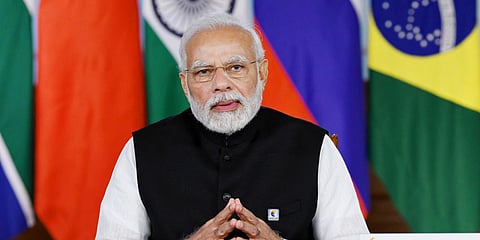

NEW DELHI: The US President, Joe Biden, was the last to emerge for the photo op of the leaders at G7 Summit in Schloss Elmau, Germany, and as soon as he did that he walked over to greet Prime Minister, Narendra Modi, tapping him on the shoulder.
During the session that followed the photo-op, Investing in a better future: Climate, Energy and Health, PM Modi said that though India was home to 17 per cent of the world’s population it accounted for only 5 per cent of global carbon emissions.
ALSO READ: India, EU trade talks resume in Delhi after a gap of a decade
“Seventeen per cent of the world’s population resides in India. But our contribution of global carbon emissions is only 5 per cent. The main reason behind this is our lifestyle, which is based on the theory of co-existence with nature,” PM Modi said.
Unfortunately, it is believed that there is a fundamental collision between the developmental goals of the world and environmental protection.
"There is also another misconception that poor countries and poor people cause more damage to the environment," PM Modi said adding that it was important to remember that access to energy shouldn’t be the privilege of just the rich.
"All of you will also agree that energy access should not be the privilege of the rich only – a poor family has the same rights on energy. And today when energy costs are sky-high due to geopolitical tensions, it is more important to remember this," PM Modi said.
India has delivered LED bulbs and clean cooking gas door-to-door and showed millions of tons of carbon emissions can be prevented while ensuring energy for the poor.
In its endeavour to protect the environment India has achieved the target of generating 40 per cent of energy from non-fossil sources nine years ahead of the target of 2030, while the target of blending 10 per cent ethanol in petrol was achieved five months ahead of the target.
"India has the world’s first fully solar-powered airport (Cochin) and its railway system will become net zero in this decade," PM Modi said.
Meanwhile, PM Modi said the health of humans and the planet are interconnected, and this is why India had adopted the approach of “one world, one health”. During the Covid-19 pandemic, India found creative uses of digital technology for health, and the G7 countries can help India to take such innovations to developing countries.
Yoga and traditional medicines in many countries are assets that can be used for holistic health, Modi said, adding that WHO has decided to set up a global centre for traditional medicine in India. This centre will be a repository of traditional medicine systems from across the world and encourage research in this area.
Besides India, Indonesia, South Africa, Argentina and Senegal have been invited to the Summit. PM Modi met many leaders on the sidelines of the Summit.
In his interaction with German Chancellor Olaf Scholz, PM Modi said that they discussed cooperation in key sectors like commerce and energy.
"We also had deliberations on furthering environment-friendly growth of our planet," PM Modi added.
During his interaction with Indonesian President, Joko Widodo, PM Modi exchanged views on Indonesia’s forthcoming G20 presidency.
PM Modi also had interactions with French President Emmanuel Macron, Argentinian President Alberto Fernandez and the President of South Africa.
During his meeting with the President of South Africa, Cyril Ramaphosa, PM Modi welcomed the WTO agreement that supports the production of Covid vaccines in developing countries.
PM Modi has been invited thrice to the G7 Summit since 2014. This is indicative of India’s emerging clout globally.